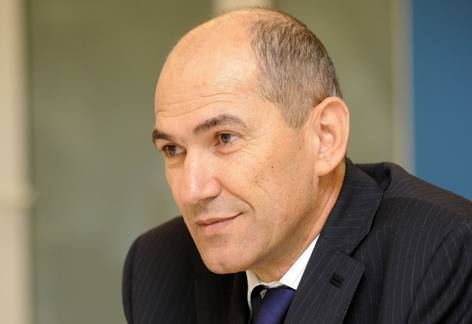NEWS
Prime Minister Janez Janša on Slovenia's efforts to overcome the financial and economic crisis
The Slovenian Prime Minister, Janez Janša, appeared yesterday evening as a guest on Info TV, where he spoke in particular about Slovenia's efforts to overcome the economic and financial crisis, while also tackling some other current topics related to the domestic political situation.
Among other things, the Prime Minister said that it is vital that the trends we have been witnessing over the last three years do not continue. In his view, Slovenia must not become either a financial problem or an issue in terms of being the new economic and social "sick man" of Central Europe. In his opinion, it is therefore crucial that the measures that should have been implemented in 2009, or at least by not later than the first half of 2010, now be adopted. "There are other countries that were also in crisis, but from which they have emerged, and can now demonstrate solid economic growth precisely because they took appropriate measures at the time," Prime Minister Janša pointed out.
He went on to emphasise that Slovenia has incurred excessive debts over the past three years, which means that the necessary measures will have to be adopted in increasingly difficult circumstances. In this context, he nevertheless pointed out that the Government will try to coordinate crucial measures within the framework of a social dialogue and to ensure that the burden is distributed fairly. In his view " the state must protect those who work hard". Moreover, the Partnership for Development remains a serious proposition.
The Slovenian Prime Minister went on to confirm that the Government will make every effort to ensure that the Slovenian economy becomes more attractive and promising for investors. In his view, exiting the crisis can be divided in two stages – the first involves streamlining and cuts, and the second involves a combination of economic growth and the creation of new jobs.
Elaborating further on the financial situation, Janez Janša highlighted that, according to the handover reports presented to the new ministers upon their appointment, there is a huge hole in the budget. Moreover, the checks carried out demonstrate that the situation appears to be even worse than originally thought.
Regarding the European Commission's visit to Slovenia in order to check the macro-economic situation, which is expected to take place at the beginning of March, Mr Janša expressed his view that the Commission would probably "suggest that we implement the contents of our programme and the coalition agreement, i.e. the measures that have already been implemented in most EU countries and are delivering results". In this context, he noted that Slovenia would not be the only country to be visited; there are also other countries on the European Commission's list. "The warnings are serious, but our situation is far from being as disastrous as that in Greece and some other countries," Prime Minister Janša emphasised.
Mr Janša also dealt with other issues during the interview, such as the recovery of the banking system, the price of borrowing on the international financial markets, the construction of Unit 6 of the Šoštanj Thermal Power Plant, and potential amendments to the Constitution.





